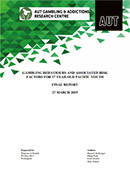
Summary
Significance of the research
This study is a component of the Pacific Islands Families Study, which is a longitudinal cohort study of a birth cohort of 1,398 Pacific infants who were recruited into the study from a South Auckland hospital in 2000. In 2017, the cohort children were 17 years old and an extensive set of gambling-related questions was included in their survey. Six hundred and thirty-two youth were surveyed.
Research has shown that Pacific adults are less likely to participate in gambling activities than European adults but that those who do gamble have a higher risk of developing levels of harmful gambling. The reasons for the increased risk are not well understood and the gambling behaviours of Pacific youth, which could lead to adult gambling behaviours, are even less researched. This research report begins to address this gap in knowledge.
Key Findings
The results of this study of PIF youth at 17 years of age, identified patterns in their experience of gambling and gambling harm.
The authors of the study concluded that:
- gambling participation amongst PIF youth was less than half that of adult Pacific gambling
- about one in three PIF youth are current gamblers but the gambling is generally a relatively infrequent and social activity
- gambling is one of several risky behaviours including alcohol consumption, and smoking cigarettes, e-cigarettes and marijuana undertaken by PIF youth
- similar to international youth problem gambling rates, one in PIF 21 youths who gambled were problem gamblers, with a greater percentage of boys than girls
- PIF youth gambling is associated with gang involvement and this has been consistently noted from when the children were nine years old. Having family members or friends who were gang members also was associated with PIF youth gambling
- PIF youth gambling occurs in the context of gambling being a common behaviour in families
- one in five PIF youth worried about the level of gambling occurring in their household and one in nine youth had experienced at least one household problem from that gambling
- the common activity of gambling in Pacific families together with harmful and risky behaviour by a significant minority of PIF youth, highlights a necessity for relevant and tailored information, education and public health resources to support Pacific families and minimise potential harms from gambling
- PIF youth have a preference for seeking help from peers rather than trusted adults such as parents, school guidance counsellors or other family members. This suggests that public health approaches that support and empower PIF youth and peers to provide adequate responses and act as catalysts and supports for behavioural change are required.
Ministry Response to the research report
The Ministry welcomes the research and the insights it provides into Pacific Island youth experience of gambling and areas for policy intervention.
The new Strategy to Prevent and Minimise Gambling Harm 2019/20 to 2021/22, commits the Ministry to undertake activities that include addressing:
- health inequalities and inequities in the experience of gambling harm in a range of at risk population groups such as Pacific youth
- cultural and linguistic barriers to accessing information and support, including new pilot services and the co-design of such services to improve service access and utilisation
- support youth and young adults
- use of new technology to promote gambling harm minimisation.
The new strategy also includes a Ministry commitment to continue funding longitudinal type research such as the PIF, where appropriate.
